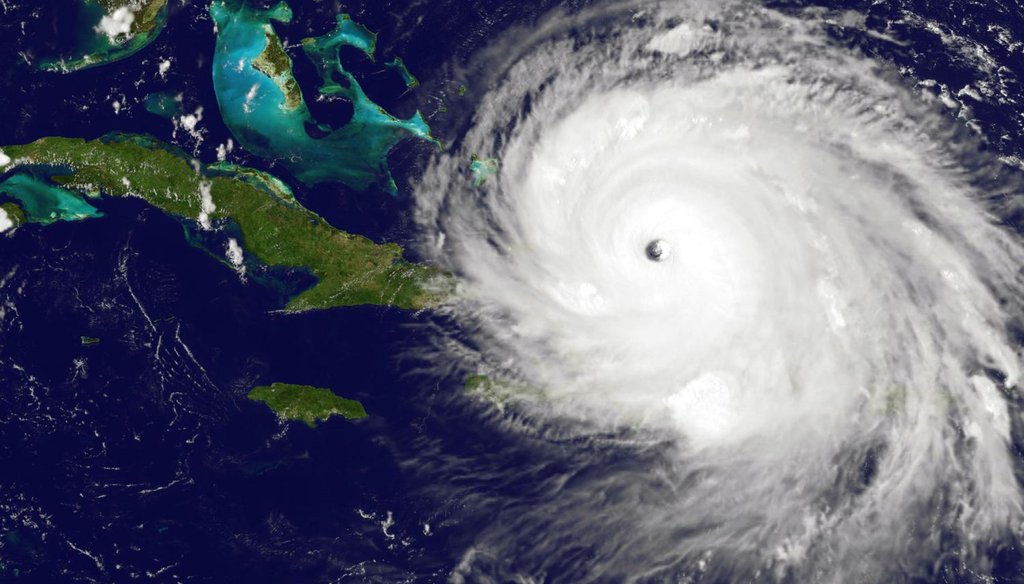

Our only agenda is to publish the truth so you can be an informed participant in democracy.
We need your help.


NOAA's GOES satellite shows Hurricane Irma as it moves towards Florida on Sept. 7, 2017.
Experts have not resorted to blaming recent hurricanes on climate change.
The experts say climate change does not cause hurricanes, but could make them more intense.
A viral image circulating on social media ridicules the idea that climate change is to blame for a recent hurricane in Florida, noting the many hurricanes that have hit the Sunshine State over the better part of two centuries.
"Florida has had 119 hurricanes since 1850, but the last one was due to climate change," claims the image, which includes a picture of a monkey.
The image was shared in a Facebook post that was flagged as part of Facebook’s efforts to combat false news and misinformation on its News Feed. (Read more about our partnership with Facebook.)
The post uses a sarcastic tone to mock what scientists say about climate change and hurricanes, but it mischaracterizes what is the consensus view among hurricane researchers. Their message is not that climate change caused recent hurricanes, but that there is evidence that it might have made them more serious.
The post also misstates the number of hurricanes. Brian McNoldy, senior research associate at the University of Miami’s Rosenstiel School of Marine and Atmospheric Science, said there have been 140 hurricanes in Florida since 1850.
The Sept. 8 post was shared by conservative commentator James T. Harris, who has more than 537,000 followers on Facebook. But neither his post nor the viral image cites a particular hurricane.
The post came one day after President Joe Biden walked through a New York City neighborhood devastated by the remnants of Hurricane Ida, where he said, "the evidence is clear. Climate change poses an existential threat to our lives."
But the text in the image has circulated since at least September 2017, when Hurricane Irma hit Florida, and some versions of the post insert the word "manmade" before "climate change."
Here’s what we found in a fact-check published Sept. 9, and one from October 2020:
Studies of Atlantic storms since 1980 found that the hurricanes that form there tend to be stronger than in the past. Human-driven climate change might play a role, although the science is unsettled.
The number of hurricanes making landfall in the U.S. each year has not increased since a century ago, but researchers said it’s likely that global warming will cause future hurricanes to be more intense.
We asked several hurricane researchers about the claim in the viral image; they agreed that climate change doesn’t cause hurricanes, but could make them more severe.
"The way we think about climate change impact on extremes, including hurricanes" is that climate change from human activity "can modify their characteristics," said Suzana Camargo, a research professor at the Lamont-Doherty Earth Observatory at Columbia University. For example, the most intense hurricanes occur more often, or the precipitation associated with particular hurricanes increases, she said.
As for climate change’s effect specifically on Florida hurricanes, "it is hard to make the assessment on a specific region, as the sample size is small," she said.
Climate change is not the cause of hurricanes, because hurricanes occur naturally, said Kevin Trenberth, distinguished scholar at the National Center of Atmospheric Research. "But climate change alters the ocean and atmosphere environment to make them more active. This can and is manifested in several ways: more intensity, bigger, longer lasting, and perhaps more hurricanes."
Phil Klotzbach, research scientist in the Department of Atmospheric Science at Colorado State University, said "we don't expect to see more hurricanes in the future due to climate change — in fact we actually see fewer — but the warmer water temperatures may lead to stronger storms in the future."
He added: "These trends may be hard to detect for many years to come, especially for landfalling hurricanes."
A viral image claimed: "Florida has had 119 hurricanes since 1850, but the last one was due to climate change."
The post uses a sarcastic tone to mock what scientists say about climate change and hurricanes, but it mischaracterizes their view.
Experts do not blame climate change for causing hurricanes, though they say it’s a possible cause of making them more intense.
The post also misstates the number of hurricanes in Florida since 1850. It has had 140.
We rate the post False.
Facebook, post, Sept. 8, 2021
PolitiFact, "Hurricanes and climate change: Getting to the real numbers," Sept. 9, 2021
PolitiFact, "How much do we know about climate change and hurricanes?", Sept. 12, 2017
PolitiFact, "Fact-checking Mike Pence’s historical hurricane claim," Oct. 14, 2020
Email, Brian McNoldy, senior research associate at the University of Miami’s Rosenstiel School of Marine and Atmospheric Science, Sept. 13, 2021
Email, Phil Klotzbach, research scientist in the Department of Atmospheric Science at Colorado State University, Sept. 12, 2021
Email, Suzana Camargo, Marie Tharp Lamont research professor at the Lamont-Doherty Earth Observatory at Columbia University, Sept. 13, 2021
Email, Kevin Trenberth, distinguished scholar at the National Center of Atmospheric Research in Boulder, Colo., Sept. 12, 2021
In a world of wild talk and fake news, help us stand up for the facts.
